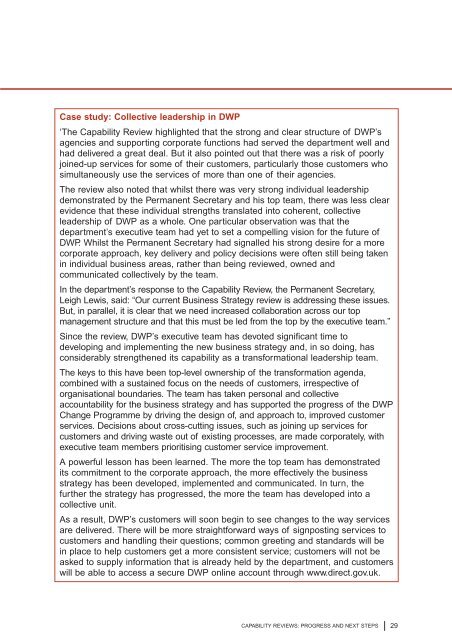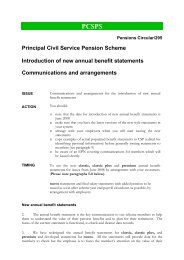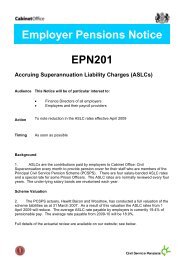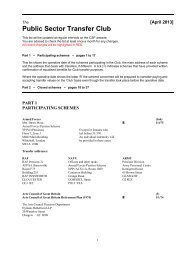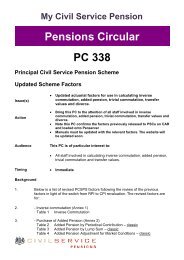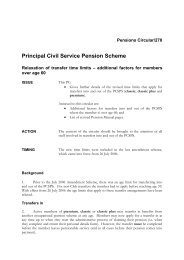Capability Reviews: Progress and Next Steps - The Civil Service
Capability Reviews: Progress and Next Steps - The Civil Service
Capability Reviews: Progress and Next Steps - The Civil Service
- No tags were found...
You also want an ePaper? Increase the reach of your titles
YUMPU automatically turns print PDFs into web optimized ePapers that Google loves.
Case study: Collective leadership in DWP‘<strong>The</strong> <strong>Capability</strong> Review highlighted that the strong <strong>and</strong> clear structure of DWP’sagencies <strong>and</strong> supporting corporate functions had served the department well <strong>and</strong>had delivered a great deal. But it also pointed out that there was a risk of poorlyjoined-up services for some of their customers, particularly those customers whosimultaneously use the services of more than one of their agencies.<strong>The</strong> review also noted that whilst there was very strong individual leadershipdemonstrated by the Permanent Secretary <strong>and</strong> his top team, there was less clearevidence that these individual strengths translated into coherent, collectiveleadership of DWP as a whole. One particular observation was that thedepartment’s executive team had yet to set a compelling vision for the future ofDWP. Whilst the Permanent Secretary had signalled his strong desire for a morecorporate approach, key delivery <strong>and</strong> policy decisions were often still being takenin individual business areas, rather than being reviewed, owned <strong>and</strong>communicated collectively by the team.In the department’s response to the <strong>Capability</strong> Review, the Permanent Secretary,Leigh Lewis, said: “Our current Business Strategy review is addressing these issues.But, in parallel, it is clear that we need increased collaboration across our topmanagement structure <strong>and</strong> that this must be led from the top by the executive team.”Since the review, DWP’s executive team has devoted significant time todeveloping <strong>and</strong> implementing the new business strategy <strong>and</strong>, in so doing, hasconsiderably strengthened its capability as a transformational leadership team.<strong>The</strong> keys to this have been top-level ownership of the transformation agenda,combined with a sustained focus on the needs of customers, irrespective oforganisational boundaries. <strong>The</strong> team has taken personal <strong>and</strong> collectiveaccountability for the business strategy <strong>and</strong> has supported the progress of the DWPChange Programme by driving the design of, <strong>and</strong> approach to, improved customerservices. Decisions about cross-cutting issues, such as joining up services forcustomers <strong>and</strong> driving waste out of existing processes, are made corporately, withexecutive team members prioritising customer service improvement.A powerful lesson has been learned. <strong>The</strong> more the top team has demonstratedits commitment to the corporate approach, the more effectively the businessstrategy has been developed, implemented <strong>and</strong> communicated. In turn, thefurther the strategy has progressed, the more the team has developed into acollective unit.As a result, DWP’s customers will soon begin to see changes to the way servicesare delivered. <strong>The</strong>re will be more straightforward ways of signposting services tocustomers <strong>and</strong> h<strong>and</strong>ling their questions; common greeting <strong>and</strong> st<strong>and</strong>ards will bein place to help customers get a more consistent service; customers will not beasked to supply information that is already held by the department, <strong>and</strong> customerswill be able to access a secure DWP online account through www.direct.gov.uk.CAPABILITY REVIEWS: PROGRESS AND NEXT STEPS29


